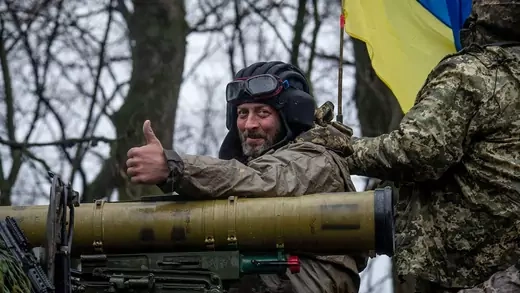In Brief
Ukraine Has Held Off Russia’s Invasion—So Far. Here’s How.
Ukraine has withstood and repelled the mighty Russian military through Western support, Russian blundering, and its own resourcefulness. However, the circumstances could be changing.
The war in Ukraine was not supposed to be raging a year later, with brutal fighting in the country’s south and east. Last February, the prevailing view in Russia and the West, and even among many Ukrainians, was that a Russian blitzkrieg would seize Kyiv, oust Ukrainian President Volodymyr Zelenskyy, and install a loyal puppet. Ukrainians could mount a widespread insurgency, but virtually no one expected them to withstand the initial assault and then engage Russia in large-scale conventional warfare, eventually regaining half the lost territory.
What explains Ukraine’s success is the country’s underestimated capabilities combined with Western support and Russian dysfunction.
Commander Zelenskyy
More on:
Zelenskyy personified the grit. His unvarnished nightly addresses from Kyiv turned him into a charismatic wartime leader who braced his country for the challenges ahead. His impassioned speeches to foreign audiences kept Ukraine in the world’s eye and persuaded Western leaders to provide ever-more sophisticated military equipment and other forms of assistance. His leadership, and battlefield successes, have convinced the overwhelming majority of Ukrainians that they can win the war. Such a victory is defined as liberating all territory seized by Russia in the last decade, despite the horrific losses of the past year—some 130,000 military and civilian casualties and a one-third plunge in economic output.
In addition, Ukraine was better prepared to take on Russia militarily than most observers initially thought, in part because of the searing defeats [PDF] at Russia’s hand during the intense phase of the conflict in the Donbas from 2014 to 2015. Ukraine came away with a cohort of veterans experienced in fighting Russian-led forces that could be mobilized in the early phases of the current conflict to thwart the Russian advance. Those defeats also convinced Ukraine of the need to rebuild its military for future battles with Russia.
With assistance and advice from members of the North Atlantic Treaty Organization (NATO), Ukraine reformed its armed forces, adopting in particular NATO practices that emphasized operational flexibility and the delegation of authority not only to local commanders but also to junior officers. The result is a nimbler and more creative fighting force that has repeatedly outmaneuvered Russia on the battlefield.
Home Turf Advantage
Combat on Ukrainian soil has conferred tremendous advantages. Intimate knowledge of the local terrain enabled Ukrainian forces to outfox the Russians, particularly around Kyiv and Kharkiv in the northeast, where the invaders stuck to the major roads. Local informant networks provided invaluable intelligence about Russian locations and movements, while they also formed the core of the resistance movements that have harassed Russians on occupied territory.
Ukrainian valor alone would not, however, have sufficed in the fight against a better-armed Russia. Western support has been indispensable. During the past year, the West has committed more than $100 billion in financial, humanitarian, and military assistance that has kept the Ukrainian government afloat and its armed forces equipped for battle. Real-time U.S. intelligence, coupled with longer-range artillery, has enhanced Ukrainian targeting of Russian ammunition depots and command posts. Western sanctions have not crippled the Russian economy as anticipated, but they have eroded Russian military capabilities and deterred most countries, including China, from resupplying Russian forces. The West has led the effort to condemn Russian aggression in international forums, notably the United Nations, where anti-Russia General Assembly resolutions have passed overwhelmingly.
More on:
Arrogance and Incompetence
One last critical ingredient of Ukraine’s success has been Russian dysfunction. The once-feared Russian armed forces have so far performed dismally. By now, the deficiencies are well-known: poorly planned operations at the strategic and tactical level; lackluster command; uninspired, ill-prepared, and inadequately provisioned troops. Pervasive corruption undercut the goals of the massive military modernization program launched more than a decade ago, thus leaving a much less capable fighting force than anticipated. Moreover, Russian President Vladimir Putin’s hubris, along with his disdain for Ukrainian and Western leaders and what he saw as an irredeemably decadent West, led him to dismiss even the possibility of stiff resistance and Western unity in the face of Russian aggression.
How long the conditions described above will prevail is an open question. In recent weeks, U.S. officials have reportedly stressed to Kyiv that their backing has limits. Maintaining the high levels of security assistance will be hard when conservatives in the Republican-controlled House of Representatives have vowed to cut it back. Concerns about depleting stockpiles could translate into less ammunition and fewer advanced weapon systems for Ukraine toward the end of this year.
Moreover, although polls in the United States and Europe continue to show strong support for Ukraine, that support is waning, and continuing socioeconomic stress will likely further erode it, especially without any concerted campaign by senior Western officials to explain clearly to their people why continued support is critical to their own security.
Meanwhile, Russia is learning from its mistakes. It is bringing more forces to the fight—some three hundred thousand Russian soldiers are now reportedly in and around Ukraine, roughly twice the number that were engaged in the initial assault last February. Continuing issues with morale, leadership, and provisions could preclude significant Russian advances, but Russia could still blunt any Ukrainian counteroffensive, denying Ukraine the rousing victories such as those in Kharkiv and Kherson last fall that boosted Ukrainian spirits and energized Western supporters.
In these circumstances, continued Ukrainian success is far from ensured. The coming year will test Ukrainians’ and Russians’ resilience and the West’s willingness to absorb the costs necessary to thwart Russian aggression. Absent any abrupt change in strategy or diplomacy, loss of lives will likely be staggering for both sides, as will the damage to property in Ukraine.
 Online Store
Online Store

